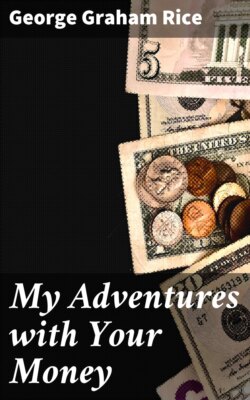Читать книгу My Adventures with Your Money - George Graham Rice - Страница 15
На сайте Литреса книга снята с продажи.
BETTING THE PUBLIC'S MONEY AT GREAT PROFIT
ОглавлениеTable of Contents
The Eastern racing season was about to close and it was decided to remove the entire force of clerks to New Orleans for the Winter and there to depart from the usual practice of selling tips only, and to bet the money of the American public on the horses at the race-track in whatever sums they wished to send. The company employed Sol Lichtenstein, then the most noted bookmaker on the American turf, to bet the money, and made him part of the organization, giving him an interest in the profits.
The Maxim & Gay Company at this time had made close to $1,000,000, and recklessly and improvidently I had let it slip through my fingers. It was "easy come and easy go." As I review that period in my career, I recall that the whole enterprise appeared to me in the light of an experiment—just trying out an idea, and having a lot of fun doing it. Because of its dazzling success I became so confident of my ability to make money at any time that I didn't take serious heed whether I accumulated or not. Besides, I had never loved money for money's sake. All the pleasure was in the accomplishing.
The races at New Orleans were advertised to start on Thanksgiving Day. On the 15th of October I ordered $20,000 worth of display advertising to run in thirty leading newspapers in the United States four days a week, until Thanksgiving. Credit was extended for the bill by one of the oldest advertising agencies in America.
The advertisements told the public to send their money to Maxim & Gay, Canal Street, New Orleans. On my arrival there, two days before Thanksgiving, I called at the post-office, and asked if there was any mail for Maxim & Gay. The post-office clerk appeared to be startled. He gazed at me as if he were watching a burglar in the act. His demeanor was almost uncanny. He didn't talk. He didn't even move. He just looked. Finally I asked, "What is the matter?"
"Wait a minute," he muttered.
He left the window. He did not return. Instead, what appeared to me to be a United States deputy marshal ambled up to my side and said, "See here; the Postmaster wants to see you."
I was escorted into a secluded chamber in the post-office building, and a few minutes later a post-office official, along with three or four assistants, came into the room.
"What's the trouble?" I asked.
"You bring us a recommendation as to who you are and what you are and all about yourself before we will answer any of your questions as to how much mail there is here for you," the official said.
I smiled. The advertising, then, was a success.
Having been employed as a newspaper man in New Orleans a few years before, I knew one of the leading lawyers of the city and several bank officials. Within thirty minutes I had lawyer and bank men before the Postmaster, vouching for my identity. Thereupon I was informed that there were 1,650 pieces of registered mail, evidently containing currency, and, in addition, twelve sacks of first-class mail matter, which contained many money-orders, checks and inquiries. The official said that in the money-order department they had notices of nearly 2,000 money-orders issued on New Orleans for the Maxim & Gay Company.
I sent a wagon for the mail, and notwithstanding the fact that a force of four men under me opened the letters and stayed with the job for two days, the task was not completed when the first race was called on Thanksgiving Day. On adding up the receipts, we found a little over $220,000.
The meeting continued 100 days, and our total receipts for the whole period were $1,300,000.
Maxim & Gay's system of money-making at New Orleans was as follows:
We charged each client $10 per week for the information. We charged 5 per cent. of the net winnings in addition, and we further contracted to settle with customers only at the closing odds for bets placed, retaining for ourselves the difference between the opening odds and the closing odds. The profit averaged approximately $7,000 a day for 100 days—to us.
As a guarantee of good faith, the Maxim & Gay Company agreed with its clients that each day it would deposit in the post-office and mail to them a letter bearing a postmark prior to the hour of the running of the race, naming the horse their money was to be wagered on; and this was always done. An honest effort, too, was always made to pick a horse that was likely to win, for even a child can see that if we did not intend to bet the money and wanted to pick losers, all we would have had to do was to make book in the betting ring at the race-track and not spend thousands of dollars in advertising for money to lay against ourselves.
Did we invariably bet the money of our clients on the horse we named?
Yes, always—except once!
